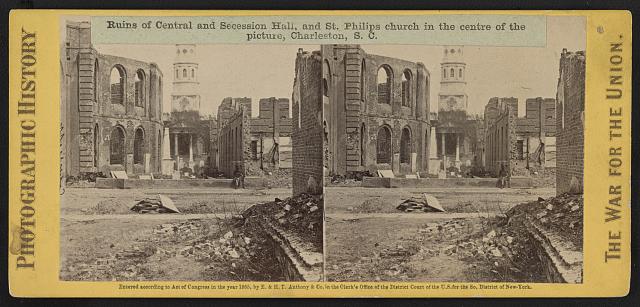self-congratulatory applause, that is

‘Charleston is ours!’ (“Ruins of Central and Secession Hall, and St. Philips church in the centre of the picture, Charleston, S.C.” Library of Congress)
The following seems to have been published right around Inauguration Day 1865. Several Northern cities apparently held celebrations for recent victories and to mark President Lincoln’s second inauguration. New York’s was postponed two days because of heavy rain on March 4th. It struck me that such triumphal celebrations were a bit overblown and premature. A newspaper in upstate New York thought such “frenzied and malignant exultations” proved that many on the North wanted to fight the war for genocidal purposes and ignored the fact that the South was pretty much invincible under the leadership of General Lee.
From a Seneca County, New York newspaper in March 1865:
“The End of the Rebellion.”
The evacuation of Charleston and Wilmington, and their occupation by the Federal forces, furnish another opportunity for fools to prediet [predict] the “end of the rebellion,” with scarcely any further efforts on the part of the Federal armies. These events, together with the re-inauguration of Abraham Lincoln, are deemed of sufficient importance for national congratulation by certain office-seeking gentlemen of New York city, and they recommend that all “loyal” folks unite in celebrating this day in an appropriate manner. The frenzied and malignant exultations manifested by many at the North over the recent success of Sherman, clearly proves that they never had any desire that the war should be prosecuted for the purpose of re-union, but only to gratify a long-cherished wish – their ruling passion – the extermination of the Southern population. “Sumpter [sic] is ours,” exclaims “loyalty,” now that its heroic defenders have been called elsewhere, and the city which has withstood four years of such bombardment as was seldom if ever known before, is quietly abandoned, after the destruction of the most valuable portion of fire. Strangely enough, no thought is given by the gaping multitude to the fact that the giving up of a city associated with so many of the deepest emotions that can stir the human breast, is a most significant proof of moral strength, on the part of both the government that orders and the garrison and people that obey. Manifestly, instead of being a proof of weakness, the recently adopted policy of abandoning the sea coast cities in order to concentrate an inland army, is a certain source of strength, and only argues the invincibility and determination of the South under so consummate a commander as Gen. Lee. No [,] the end of the rebellion is not yet. Under the present policy of the administration we shall have war and nothing but war. – And just in proportion as hatred, animosity and injustice is manifested by us towards the South, will their desire to re-enter the Union be dampened, and their determined resistance be felt.
The March 25, 1865 issue of Harper’s Weekly (at Son of the South) maintained that the big parade only looked like an ancient Roman triumphal entry; there were important differences, including the realization that there was still more fighting ahead.

![Robert E. Lee at Chancellorsville [on horseback, being cheered by troops], May 2, 1863 (c1900; LOC: LC-USZ62-51832)](https://www.bluegrayreview.com/wp-content/uploads/2013/10/3a51856r-235x300.jpg)